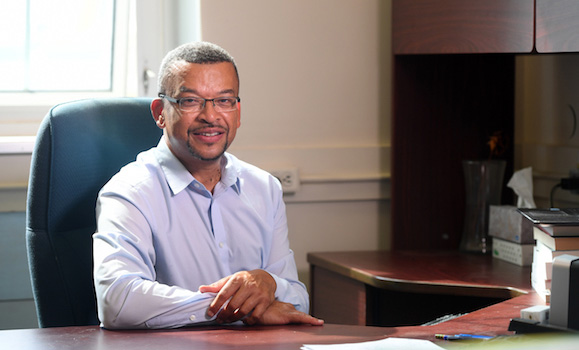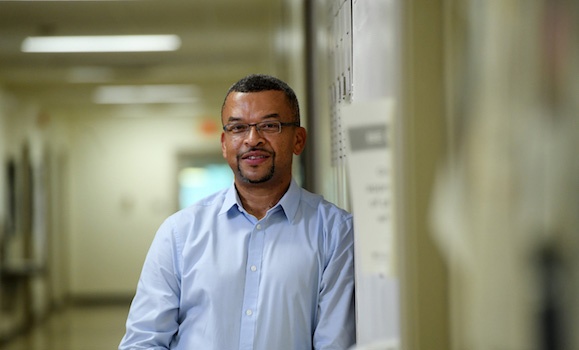Dr. Kevin Hewitt, a professor in the Department of Physics and Atmospheric Science and a former chair of Dalhousie Senate, has been named associate dean, equity and inclusion in the Faculty of Science.
The new position was created to lead the development and implementation of an equity, diversity, inclusion, and accessibility (EDIA) strategy and framework for the Faculty.
“This new associate dean position is a first for Dal Science and demonstrates our commitment to addressing the gaps in our existing EDIA initiatives and better supporting students, faculty and staff from equity-deserving groups,” says Dr. Chuck Macdonald, dean of the Faculty of Science.
“Dr. Hewitt’s experience and long list of accomplishments during his more than 20 years at Dal, both through research excellence and a commitment to equity and community building, makes him an ideal fit for this new role."
Hewitt's new position begins immediately.
“Her mentorship was what drove me”
Born in England, Hewitt joined his grandmother in Saint Vincent and the Grenadines when he was just eight months old, while his mother immigrated to Canada.
“Canada wouldn’t accept immigrants with dependents,” he recalls.
At 10, he was able to move to Toronto to be reunited with his mother. Despite excelling in school and skipping a grade while growing up in the Caribbean nation, Hewitt was immediately moved back a grade upon entering school in Canada. “That spoke to the inequity at the time,” Hewitt says. “Coming to this country when I was 10 and experiencing some of the things I did, I wanted to make things better for that next generation.”
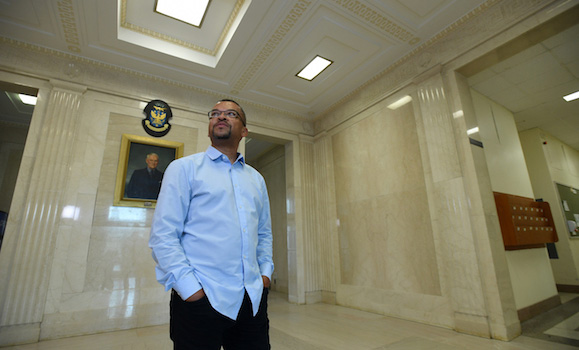
Both maternal figures in his life reinforced the importance of education.
“For immigrants to this country like my mother, education is the number one way in which you can succeed,” he says. “Her mentorship was what drove me.”
Hewitt knew that he would pursue post-secondary education, but he wasn’t sure what path to follow. His mother was a nurse and wanted Hewitt to become a medical doctor, but upon visiting her at the hospital where she worked, he realized he couldn’t “handle the death you would encounter.”
He studied biology and physics, later “falling in love with physics.” His work has not completely abandoned medicine, though. “Developing medical instruments for diagnosing liver disorders brings me back to that goal of impacting medicine,” he says, just as his mother had hoped for him.
A legacy of outreach and inclusion
In 1999, while working toward a doctoral degree in physics from Simon Fraser University in British Columbia, Hewitt organized a science outreach event for elementary to junior high school-age African Canadian students called “Imhotep’s Legacy Project I.” Hewitt describes it as an attempt to marry his interest in community building with his passion for science.
“My mother always emphasized the importance of community building and I took that to heart.”
After earning his PhD in 2000, Hewitt was encouraged by former Simon Fraser professor Dr. Jeff Dahn to come to Dalhousie’s Department of Physics and Atmospheric Science as a postdoctoral fellow that same year. After his fellowship, he started as an assistant professor in 2001. That initial outreach event inspired the 2003 creation of the Dal-affiliated Imhotep’s Legacy Academy (ILA) by Hewitt, Barbara Hamilton-Hinch (currently Dal’s assistant vice-provost equity and inclusion) and Wayn Hamilton.
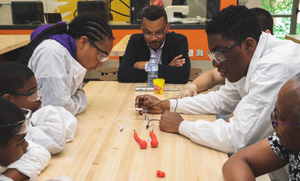 Through mentorship activities and after-school programming, ILA aims to increase the representation of Nova Scotia youth of African descent in STEM fields (science, technology, engineering and math). In 2011, ILA received a $1-million endowment from TD Canada Trust toward the creation of ILA-TD Scholarships for African Nova Scotian youth enrolled in STEM programs at Dalhousie.
Through mentorship activities and after-school programming, ILA aims to increase the representation of Nova Scotia youth of African descent in STEM fields (science, technology, engineering and math). In 2011, ILA received a $1-million endowment from TD Canada Trust toward the creation of ILA-TD Scholarships for African Nova Scotian youth enrolled in STEM programs at Dalhousie.
Hewitt led ILA for 10 years, an experience he describes as a “labour of love.” “Every year when we celebrated the students who passed through the program, I was in tears because you just saw the impact it was having on them.”
Related reading: Kevin Hewitt recognized by NSERC with its Science Promotion Award
A new direction for Dal Science
From 2015 to 2021, Dr. Hewitt served as chair of Dalhousie’s Senate, the university’s senior academic governing body. In a Dal News story looking back at his six years in the position, he spoke of diversifying Senate’s membership, revising its policies and programs, and working with former Dal President Richard Florizone to authorize the Report on Lord Dalhousie's History on Slavery and Race.
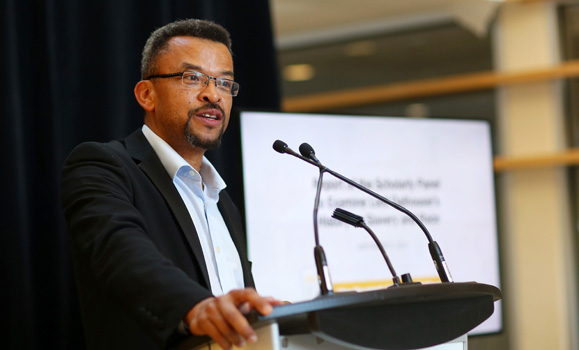 Kevin Hewitt, then-chair of Dalhousie Senate, speaks at the 2019 reception for the Lord Dalhousie Report. (Nick Pearce photo)
Kevin Hewitt, then-chair of Dalhousie Senate, speaks at the 2019 reception for the Lord Dalhousie Report. (Nick Pearce photo)
When the opportunity presented itself to apply for a new role with the Faculty of Science, Hewitt recognized that his Senate experience, along with the connections he made there, would be beneficial.
“That work as Chair of Senate allowed me to see what was happening across the institution from an EDI lens,” he says. “It also taught me the importance of having diverse voices at the table in order to advance changes to our policies, programs and practices.”
Hewitt has also served on national committees that advised Tri-council agencies on incorporating equity into the research evaluation process. “I wanted to bring that national and university-wide experience to bear on a faculty that I care deeply for, that I’m a member of, and that has a great deal of support for us to become more equitable.”
Hewitt looks forward to getting started in the role by collaborating with Science’s leadership team, students, staff, faculty members and its equity committee.
“Together we can really advance the faculty, because equity is not a silo. It’s something that has to be incorporated into everything we do. And when I say equity, I mean a matter of fairness. Fairness in terms of access, what’s in the curriculum and representation.”
